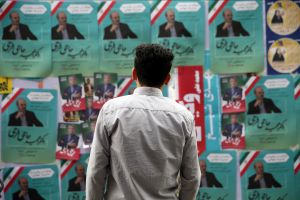New indirect talks between the United States and Iran on a return to the Iran deal could help the outlook for a moderate candidate in the next election.
Iranian presidential elections are set for June 18. The current president, Hassan Rouhani, who earned initial praise in Iran after successful negotiations for the Joint Comprehensive Plan of Action (JCPOA) in 2015, is ineligible for reelection and has steadily lost public support after the US withdrawal from the nuclear deal in 2018.
A joint survey of the Iranian public conducted by the Chicago Council on Global Affairs and IranPoll provides insights into how Iranians view this pivotal moment for Iran. Iranians view Rouhani’s policies quite negatively, especially his economic policies, and for their next leader they want someone who is critical of Rouhani. However, while Iranians did not feel the economic improvements from the JCPOA they expected, new indirect talks between the United States and Iran on a return to the agreement could help the outlook for a moderate candidate.1
Key Findings
- As Rouhani serves his last months as the Iranian president, a majority (62%) say they have an unfavorable view of him. Rouhani’s unfavorable ratings in 2021 and 2020 (63% unfavorable) are the highest they have been since 2014, when just 13 percent had unfavorable views.
- As the election nears, nearly two-thirds of Iranians say they would prefer a critic of Rouhani to be the next president of Iran (17% prefer a supporter of Rouhani).
- Asked to volunteer who they wish to be the next president, a plurality of Iranians say they are undecided (35%). Of the rest, the top contenders are conservative politicians: Ebrahim Raisi (27%), Mahmoud Ahmadinejad (13%), and Muhammad Baqer Ghalibaf(8%).
In Rouhani’s Final Months as President, Iranians Are Widely Dissatisfied with Him
Though Rouhani’s first term benefited from the implementation of the JCPOA, his second term has seen the collapse of the agreement, and Iranians have grown increasingly disappointed in Rouhani as a leader. Although successful in negotiating the 2015 nuclear deal and in opening at least a dialogue with the West, he was unable to realize his campaign pledges of political and social reform and economic improvement. The public in Iran has registered their discontent, especially with the country’s economic shortcomings.
Asked whether Rouhani’s policies have improved or worsened the strength of the Iranian economy, Iranians’ standards of living, and income equality in Iran, at least 6 in 10 say his policies have worsened these measures.
- 1 This brief is based on coordinated surveys conducted by the Chicago Council on Global Affairs (Chicago, United States) and IranPoll (Toronto, Canada). The details of the survey samples are provided in the methodology section.
Iranians Have Negative View of Rouhani Economic Policies
February 8-28, 2021 | n = 1,006
IranPoll - Chicago Council Surveys
Iranians’ criticisms of Rouhani’s economic policies coincide with grim evaluations of the economic situation in Iran. Nearly 7 in 10 Iranians say the economic situation is getting worse (68%), a steady increase from 37 percent in May 2015. And, asked about what has had the greatest negative impact on the Iranian economy, a majority (58%) continues to point to domestic economic mismanagement and corruption rather than sanctions (35%).2 These results perhaps suggest that more now lay blame at the government’s door.
As concern about the economy has steadily grown, Rouhani’s approval rating has steadily fallen. At 36 percent, his approval rating is the lowest it has been since first tracked in 2014. While Iranians were generally supportive of him until 2018, unfavorable views began to dominate after US President Donald Trump pulled out of the JCPOA in May 2018.
Declining Opinion of Hassan Rouhani
I will now read you the names of some prominent political figures in Iran. Regardless of whom you support, please indicate to what degree you have a favorable or unfavorable view of each. (%)
January 26 - February 6, 2021 | n + 1,008
IranPoll - University of Maryland
When those who express an unfavorable opinion of Rouhani are asked why, the most frequent response they volunteer are incompetence and mismanagement (15%), lack of honesty and failure to keep promises (19%), and, more generally, the bad economic situation in the country (20%). For those who have favorable views of Rouhani, the most common reasons are that he tries to solve problems and serve the people (18%) and that he is the president of the country (18%).
Beyond Iranians’ immediate dissatisfaction with Rouhani’s leadership, his declining reputation may have implications for the 2021 presidential elections. Asked whether they want the next president of Iran to be from among the supporters or critics of Rouhani, nearly two-thirds of Iranians (64%) say they would prefer a critic of Rouhani. Given his moderate status in Iranian politics, this result could imply that the Iranian public is leaning toward a more conservative candidate. According to other IranPoll results, the support base for the reformists has shrunk by about 8 percentage points since 2017, while the support base for the conservatives has grown by 4 percentage points. Still, more Iranians self-identify as a reformist (21%) or leaning reformist (10%) than identify as a “principlist” (19%) or leaning principlist (7%). Four in 10 (43%) have no preference.
While Many Iranians Remain Undecided, Conservative Candidates Are Most Popular
Two and a half months out from the election, just 10 individuals have declared their candidacy, while several others have simply expressed interest. Although Iran’s Guardian Council, half of whose members are appointed by Supreme Leader Ali Khamenei and the other half by the parliament, will ultimately determine who has the constitutional qualifications to run in the June elections, some Iranians have already begun to weigh in on whether they will vote, who they want to win, and who they think will win.
At this stage, less than half (48%) of Iranians say it is very likely they will vote in the upcoming election and 25 percent say they may vote. Based on IranPoll’s Iranian Voter-Turnout model, the projected turnout rate now stands at around 52%.3
IranPoll’s February survey asked Iranians to volunteer in an open-ended question who they want to win the presidential election. A plurality of 35 percent say they don’t know. Of the rest, the most frequent mention by far was Seyyed Ebrahim Raisi (27%), Iran’s current chief justice and a member of the Assembly of Experts; followed by former president Mahmoud Ahmedinejad (13%), and current Speaker of Parliament Muhammad Baqer Ghalibaf (8%). All three are political conservatives.
- 3IranPoll has developed an Iranian Voter-Turnout model that has accurately predicted past Iranian presidential elections. This model is based on five points of data: 1. The respondents’ self-reported probability to vote of voting. 2. The respondents’ self-reported probability of changing their mind about voting before the election. 3. The respondents’ history of voting in previous elections. 4. The degree of importance the respondents attribute to the upcoming election. 5. The degree of impact on the outcome the respondents attribute to the votes of people like them. Read more on the Voter-Turnout model.
No Decisive Favorite Volunteered in Upcoming Iranian Election
From among the political figures you know, who do you wish to become Iran's next President?
February 8-28, 2021 | n = 1,006
IranPoll - Chicago Council Surveys
When asked to rate specific candidates favorably or unfavorably, three-quarters of Iranians (75%) said they have a favorable view of Raisi.4 However, he has said he would not participate in the 2021 elections, a move some analysts say is meant to consolidate support behind a single conservative candidate. Additionally, some expect Raisi may be a candidate for Iran’s next Supreme Leader.
Ahmadinejad, a former Iranian president and current member of the Expediency Council, has not explicitly declared his candidacy either, but he has been an outspoken critic of Rouhani’s administration, and with an approval rating of 57 percent,5 he is more popular than Rouhani. Despite any intentions he may have to run, the likelihood of his qualifications being approved by the Guardian Council appear slim. Primarily, this is due to Ahmedinejad’s previous friction with Khamenei over the appointment of an intelligence minister in 2011 and Ahmadinejad’s unwanted candidacy in 2017.
Besides being speaker of the Parliament, Ghalibaf is the former mayor of Tehran and a former commander of the Iran Revolutionary Guard Corps Air Force. While he has not declared his candidacy, he ran in 2013, coming in second to Rouhani, and was planning to run in 2017, though he dropped out to consolidate support behind Ebrahim Raisi. Despite his popularity in this poll, analysts say Ghalibaf’s candidacy in this election may be a risk for him. It is generally believed that if Raisi decides to run, Ghalibaf will most probably not.
Even if Raisi, Ahmedinejad, or Ghalibaf end up running, it’s possible the undecided portion of Iranians may swing the election in either direction. Asked who they expect will become Iran’s next president, a majority say they do not know (54%). Given this uncertainty, it seems there is still enough time for voting intentions to be swayed.
Could Biden’s Foreign Policy Influence the Outcome?
The current numbers suggest that people close to Rouhani are going to have more difficulty winning public confidence in the election than those who have not been close to him. That does not, however, mean it is impossible. Much could change from now until the election. One uncertain variable is US policy toward Iran.
Though the US withdrawal from the JCPOA and the reimposition of sanctions seem to have significantly contributed to the unpopularity of Rouhani and his platform, US President Joseph Biden’s foreign policy could have an impact on Iranian attitudes leading up to the election. While a majority of Iranians expect US-Iran relations to remain the same during the Biden presidency, more than a quarter (28%) expect relations to improve, while just 1 in 10 expect relations to worsen. And although relatively few Iranians expect an improvement in relations, half of Iranians (50%) think it is very likely (6%) or somewhat likely (43%) that sanctions would be loosened during the Biden presidency.
Iranians Expect US-Iran Relations to Stay the Same under Biden
What do you expect will happen to US-Iran relations during the Biden presidency; will they improve, worsen, or remain the same?
February 8-28, 2021 | n = 1,006
IranPoll - Chicago Council Surveys
Given that there is little expectation of improvement for US-Iran relations over the next four to eight years, Biden’s foreign policy decisions could push Iranians in either direction for the upcoming election. With the United States indirectly engaging in talks with Iran and other JCPOA signatories to revive the deal, it’s possible Rouhani, and the reformists by association, could recoup some of their credibility lost with the deal’s collapse. Although Iranians are wary of the United States, there is sizable popular support for the agreement among publics in both Iran and the United States.
Methodology
The Iranian part of the study was conducted as a part of IranPoll’s State of Iran Survey Series utilizing its standard nationally representative sampling from February 8 to 28, 2021, through telephone interviews with 1,006 Iranians. The sampling margin of error was +/- 3.09%. All interviews were monitored in real-time by call-center supervisors. The samples were Random Digit Dialing (RDD) samples drawn from all landline telephones in Iran. The samples were stratified first by Iranian provinces and then in accordance with settlement size and type. All 31 Iranian provinces were represented in proportions similar to their actual populations, as were rural and urban areas. When a residence was reached, an adult was randomly selected from within that household using the random-table technique. An initial attempt and four callbacks (total of five attempts) were made in an effort to reach and complete an interview with the randomly selected respondents.
Further details of the methodology are at www.IranPoll.com/method and https://www.iranpoll.com/publications/ccga2.
About IranPoll
IranPoll® is an independent, full-service, opinion-research firm focusing exclusively on Iran. Believing in the scientific method, IranPoll provides its clients with tailored research services, evidence-led counsel, and a dispassionate understanding of the Iranian people that is based on empirical evidence and sound scientific methods. It is directed by Dr. Amir Farmanesh, an Iranian/Canadian scholar with a doctoral degree from University of Maryland School of Public Policy.
A division of People Analytics Inc. and operating from Toronto, Canada, IranPoll conducts research on Iranian public opinion using various modes of data collection, including telephone polling (including a monthly Omnibus), in-depth interviews, focus groups, and online panels (Business-to-business and 51,000-member business-to-consumer).
IranPoll operates multiple polling call centers with 106 active calling stations and conducts over 160,000 interviews per year in Iran. Relying on scientific opinion research methods, IranPoll was able to provide a fully accurate prediction of the outcome of Iran’s May 2017 presidential election, which was published by The Economist before the initial official results were declared.
Complementing its extensive field capacity, IranPoll’s databank is the single most comprehensive databank of Iranian opinion polls, containing more than 3,000 questions on 430 topics and subtopics from more than 350 probability sample surveys conducted from 2006 to the present. Through its exclusive access to this databank, IranPoll provides its clients with evidence-based consultancy on issues relating to Iran and the Iranian people.
IranPoll is a member of American Association for Public Opinion Research (AAPOR) and World Association for Public Opinion Research (WAPOR) and follows their industry standards.





